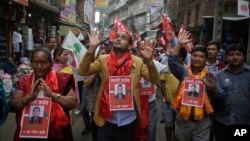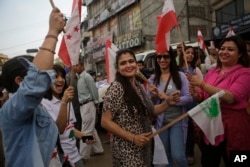Much has changed since Nepal last held local elections 20 years ago: The Himalayan country’s 240-year monarchy was abolished, federal democracy was introduced and political wrangling took center stage. Earthquakes ravaged the country. A Maoist insurgency left thousands dead. And widespread poverty ensured daily life for many remained a struggle if not a misery.
Through it all, Nepal’s 29 million citizens have had only government-appointed bureaucrats to look to for answers or help with settling local disputes. Many voters said they were excited for the chance this weekend to choose local representatives for the first time since 1997.
“We can finally get our true representatives back in our neighborhoods,” said 19-year-old university student Suman Sharma of Kathmandu. “The last time these elections were held, I wasn’t even born.”
Two rounds of voting
Nepal will hold the first of two rounds of voting Sunday, with nearly 50,000 candidates vying for 13,556 positions on village and city councils covering nearly half the country.
For weeks, campaign posters have lined village roads. Political party flags flapped in the mountain breeze. And more than 40,000 police officers were fanning out to polling stations to keep the peace.
Candidates were going door to door to greet villagers with promises of building roads and schools, improving water sanitation facilities, providing electricity or even metro systems.
“This election is very important because these local bodies bring the government to people’s front yard,” said Surya Prasad Sharma, spokesman for the Election Commission.
Democracy stabilizing
More importantly, analysts said the local balloting offered a signal that Nepal’s fractious democracy may be stabilizing.
Two years ago, lawmakers passed a new constitution to replace the old system of monarchy, and to lay out the rules for provincial and parliamentary polls. The constitution was considered a major victory, following eight years of political bickering over its terms. But not everyone was happy, and its passage sparked months of protests by ethnic groups in the south that felt shortchanged by how the document divided the country’s districts.
“A lot of issues like the ethnic troubles could have been avoided if there had been continued representation in the local level,” said political analyst Dhruba Hari Adhikary.
Janak Joshi, who works as a clerk in a government land registry office, agreed the lack of representative government at the local level had hurt society overall.
“For the past 20 years, government-appointed officials have been functioning in these positions. They didn’t represent the people or care about what was wrong or needed in city or neighborhood,” Joshi said. “Now we will finally get people who would at least listen and work for us.”
List of needs
Many voters said they were eager for help in pressing the government to reconstruct hundreds of thousands of homes toppled in a devastating earthquake in 2015. So far, less than 4 percent have been rebuilt.
Others hoped local representatives would prioritize the need for justice after a decadelong Maoist insurgency that ended in 2006, leaving 17,000 dead. The government has yet to address more than 58,000 complaints of murder, abuse and or other human rights violations. Nor has it been able to reveal what happened to some 1,500 who disappeared during the fighting.
Some voters wondered if newly elected representatives could help revive local economies, sorely needed with some 25 percent of the population living in poverty. And some saw a chance to advance progressive policies for improving education or rights and opportunities for women.
Little trouble was expected at Sunday’s polls, though one small Maoist party has called a general strike, saying the country needs more political reform before it can be ready for such polls.
The second round of voting, scheduled for June 14, could see protests among ethnic groups unhappy with district boundaries in southern areas of the country, election officials said.

